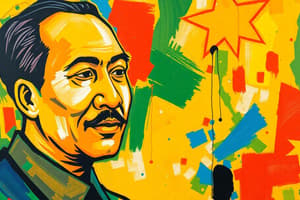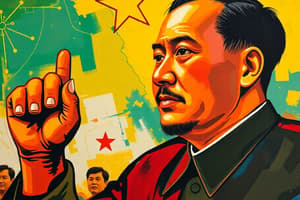Podcast
Questions and Answers
Theo bạn, điều gì là quan trọng nhất trong tư tưởng của Hồ Chí Minh về sự đoàn kết của nhân dân?
Theo bạn, điều gì là quan trọng nhất trong tư tưởng của Hồ Chí Minh về sự đoàn kết của nhân dân?
- Đoàn kết giữa các dân tộc trên thế giới
- Đoàn kết giữa các giai cấp trong xã hội
- Đoàn kết giữa nhân dân trong phạm vi quốc gia (correct)
- Đoàn kết giữa các cá nhân trong một tổ chức
Theo tư tưởng của Hồ Chí Minh, việc nâng cao đạo đức cách mạng là vấn đề được quan tâm như thế nào?
Theo tư tưởng của Hồ Chí Minh, việc nâng cao đạo đức cách mạng là vấn đề được quan tâm như thế nào?
- Rất ít quan trọng, chỉ cần tập trung vào mục tiêu chính trị
- Chỉ quan trọng đối với cán bộ đảng viên, không cần thiết đối với quần chúng nhân dân
- Rất quan trọng đối với cả cá nhân và tổ chức (correct)
- Quan trọng ở cấp độ cá nhân nhưng không quan trọng ở cấp độ tổ chức
Theo tư tưởng của Hồ Chí Minh, vấn đề nào được ông coi là ưu tiên hàng đầu?
Theo tư tưởng của Hồ Chí Minh, vấn đề nào được ông coi là ưu tiên hàng đầu?
- Phát triển kinh tế
- Củng cố quyền lực của Đảng
- Xây dựng quốc phòng
- Giáo dục, chăm sóc sức khỏe và đời sống của nhân dân (correct)
Theo bạn, vai trò của tư tưởng Hồ Chí Minh trong việc định hình bản chất chính trị của Việt Nam như thế nào?
Theo bạn, vai trò của tư tưởng Hồ Chí Minh trong việc định hình bản chất chính trị của Việt Nam như thế nào?
Theo bạn, điều quan trọng nhất trong tư tưởng của Hồ Chí Minh về vai trò của nhà nước là gì?
Theo bạn, điều quan trọng nhất trong tư tưởng của Hồ Chí Minh về vai trò của nhà nước là gì?
Study Notes
Ho Chi Minh's Thought on the State of the People, By the People, For the People
Ho Chi Minh, the renowned Vietnamese revolutionary leader, played a significant role in shaping the political landscape of Vietnam. His vision of governance was centered around the idea of a state that serves the people and operates according to the rule of law. This concept is encapsulated in his famous quote stating that the state is of the people, by the people, and for the people.
The Importance of Law and Democracy
According to Ho Chi Minh, morality forms the foundation of law and societies should respect and protect human rights. He believed that people were born free and should always enjoy freedom and equality. In his thoughts, democracy was essential for the state, not just through the content of laws recognizing the rights and interests of the people, but also in the process of making those laws, ensuring participation from all walks of life.
Human Rights
Ho Chi Minh's thought encompassed comprehensive human rights, covering civil, political, economic, cultural, and social aspects. These included the right to mastery, legal protection, travel, residence, citizenship, marriage, family, property ownership, and freedom of thought, belief, and religion.
National Interests
Ho Chi Minh viewed national liberation as a means to secure the national interests of Vietnam's working class, who had no other objectives beyond the welfare of their nation. His commitment to independence and freedom extended beyond Vietnam's borders, advocating for equal treatment and recognition of Vietnamese rights by foreign nations.
Solidarity and Revolutionary Ethics
One of Ho Chi Minh's core beliefs was solidarity among the people, which he saw as crucial for the strength and unity of any society. He emphasized the importance of maintaining and promoting shining morality within individuals, cadres, and party members to foster revolutionary ethics.
Education and Well-being
Throughout his life, Ho Chi Minh prioritized education, healthcare, housing, and the overall well-being of the Vietnamese population. He envisioned a country where every citizen could live with dignity and access fundamental rights and services.
Emulating Ho Chi Minh's Thought
Since the post-August Revolution period, Vietnam has continued to apply Ho Chi Minh's thought in its governance by regularly reforming and improving its legal system, ensuring its suitability to the nation's socio-economic conditions, and reflecting the will of the people.
In essence, Ho Chi Minh's political thought revolved around the idea of a state that serves its people, operates legally, and fosters unity and solidarity. His vision has been instrumental in shaping Vietnam's political landscape and continues to inspire its people in their quest for national prosperity and well-being.
Studying That Suits You
Use AI to generate personalized quizzes and flashcards to suit your learning preferences.
Description
Test your knowledge on Ho Chi Minh's political thought regarding governance, law, democracy, human rights, national interests, solidarity, and well-being. Explore his vision of a state that serves the people, operates legally, and fosters unity and solidarity.




